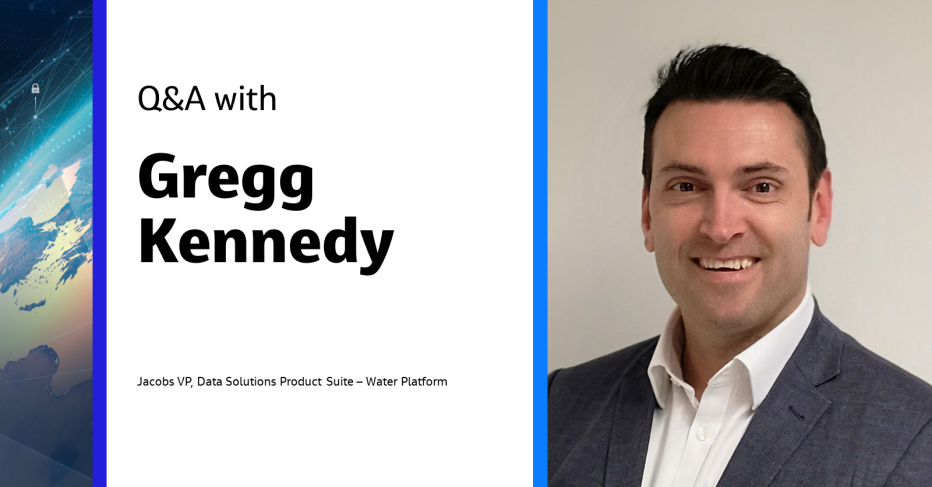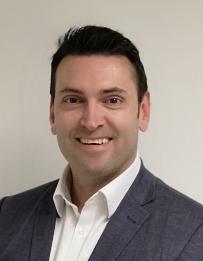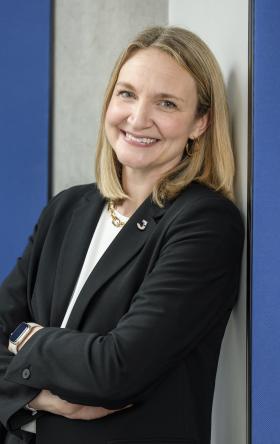As the Vice President of the Jacobs Data Solutions Product Suite – Water Platform, Gregg Kennedy is a key part of our team driving strategic, transformational growth across data and cyber solutions . His agile career and global experience have empowered him with the skillset and approaches needed to drive Jacobs forward. We caught up with him to discover more about his background, gain insights into leadership lessons and understand the value of juggling as a skill.

How did your career start?
I earned a post-grad in computer programming at university, and my undergraduate degree was in economics. I thought that was the route I wanted to follow as I enjoyed coding. But after completing that degree, I started building power stations for Scottish Power, and the rest is infrastructure and water utility history. But I never forgot the lessons I learned at university, and I consider myself one of the early adopters of JavaScript — I know I’m aging myself here! Twenty-odd years ago, we were only starting to use Web 2.0, but I really enjoyed it and saw a career there. To this day, I still use my VBA skills from back then to write Excel macros and even occasionally impress some of the youngsters in the office.
What is your favorite career achievement?
On a personal level, it’s being able to advocate for water utilities in all four corners of the globe. I’ve been privileged to travel the world and immerse myself in different cultures, and experience different approaches to infrastructure and water utilities. I’ve loved solving complex problems in several countries at different points in the maturity curve and being able to contribute and be recognized, whether for my economics, finance, program management, or just general appreciation of new technology.
However, my most rewarding career achievement is promoting people who otherwise wouldn't have stayed in the utility game. Whether that was working for Scottish Water, Sydney Water or Jacobs, I think I’ve inspired people to dedicate more of their career to infrastructure and utilities than they otherwise would have. I’ve seen many people join and then leave the utility and infrastructure industry. In most cases, it’s because they don’t see a career path or they’re not unlocking the immediate job satisfaction they're looking for. When I share my story, it helps show what’s possible. I started as a computer programmer, moved into a finance role, shifted into economics, crossed over into program management and physical delivery, and then progressed into management and corporate roles. When you share the kind of agile career path and the direct impact you can have on your local community, it can make an impression. I’ve been an advocate for infrastructure careers for 20 years, and I’ve had at least four different career paths. It’s rewarding to show people what you can get from an infrastructure career.
What advice would you give young professionals who want to work in the water sector?
If you can match your engineering, design or network knowledge with data science and an understanding of operational technology, you’ll futureproof your career and be able to take on the biggest global challenges. There is an emerging nexus between water, energy, food and production, and the world is learning that water sits at the heart of all sustainability goals. Being a water professional offers a transportable career; you can take it anywhere. Collecting hybrid skills allows you to switch from traditional engineering roles to data science-focused ones and back if it’s part of your skill suitcase. There’s a wide scope for roles, as consultant roles are available for all kinds of companies, not just councils and utilities. Even FinTech firms are getting involved in building new infrastructure and facing sustainability and water-focused challenges. If you can pair an understanding of how the water cycle works with data science skills, you’re a unicorn in the market and will turbocharge your career.
We’re seeing the rise of AI in our workplace. What’s something that AI can’t replace?
This is something I think about all the time. AI and machine learning are great advances and allow us to solve problems quickly. But after working in utilities and the water industry for most of my life, I've always been inspired by understanding the end customer's role and the stakeholders' impact. That's where there will always be a role for us, as you can’t take humanity out of decision-making. We make balanced judgments, and we’re good at reprioritizing. While decision logic is great when dealing with 99% of day-to-day issues, the remaining 1% often covers the toughest decisions where you need human judgment to consider the extra factors that point to the right decision. Sometimes, we must make what appear to be suboptimal choices, and that’s where AI and ML fail. We deal with the natural environment and human customers, and the humanity of decision-making must always be at the heart of what a utility does. We will push AI and ML to the limits, but we must retain humanity in our decision-making.
“If you can match your engineering, design or network knowledge with data science and an understanding of operational technology, you’ll futureproof your career and be able to take on the biggest global challenges. There is an emerging nexus between water, energy, food and production, and the world is learning that water sits at the heart of all sustainability goals. Being a water professional offers a transportable career; you can take it anywhere. ”
What would people be surprised to find out about you?
I used to be an actor. When I worked with Scottish Power earlier in my career, they encouraged and paid for us to do activities outside of work. I took acting lessons to improve my public speaking and enjoyed it. I ended up paying for more lessons myself and did night school. I did a few advertisements, and I wish I had continued. I want to return to it later in life, as I enjoyed being an actor, and would love to get back onto the stage.
What would we find you doing when you aren't working?
I'm trying to renovate a Victorian villa right now, which I thought would help me destress, but unfortunately, it’s just adding to my stress levels! And here’s me thinking that work can be stressful. I hope to finish that quickly so I can start working on my golf game. I'm a bit ashamed that James Brindley-Raynes (Aqua DNA Product Manager) now has a lower golf handicap than me, and I can't stand that situation. Away from renovations and golf, I'm a big animal advocate. My dream has always been to open an animal sanctuary, which I’m working toward. If I can achieve a certain level of success, I’d love to create a space where I can rehabilitate animals.
What is your proudest moment at Jacobs so far?
That's a tough one. On a personal note, I loved being appointed to my current role and feel very privileged to be asked to lead the water platform as part of our new Data Solutions product suite. But as a people-centric person, my proudest moment was when I brought an entire team of over 300 people from an office in a previous organization in Sydney into Jacobs and had them successfully embedded within a week and fully aligned with the culture and philosophy. Having them see the potential and enjoy working in their new roles was really rewarding.
What is the best advice you’ve ever received?
It’s a saying I live by: ‘Bad things happen to good people. And sometimes good people do bad things.’ It reminds me to be more tolerant. We all deal with a lot of randomness in our lives; sometimes, things are very unfair. My mantra helps me temper my first reaction and be more sensitive to other people’s experiences. Traveling and working abroad made me ten times better at being a line manager and a colleague. I come from a sheltered background and an easy upbringing in Scotland compared to many colleagues I worked with from Sri Lanka, Thailand and Indonesia. When they explain their life stories, you appreciate what true struggle is, and it highlights why you need more than just your own perspective. You need to see the world through other people's eyes; it allows you to build a better framework for making decisions.
What is a lesser-known skill of yours?
Thanks to my acting days, I could probably recite a few of Shakespeare’s soliloquies from memory, but my most surprising skill is probably that I can juggle up to five items — and not metaphorically — I mean real-life juggling. It helps me switch my brain into different modes. So, if you see me juggling, I’m doing it to create some space to think about something.
What do you most enjoy about being part of #OurJacobs?
The ability to solve the world’s biggest problems, to focus on acting local but thinking global, and interacting with experts from all over. What I love is that on any day, I could be thinking about a flooding incident in Exeter, and then two hours later, I could get a phone call to talk about net emissions at a plant in New Mexico. I've always been a keen traveller and have been fortunate enough to work in different parts of the world. Jacobs gives me that global connectivity.
About the interviewee

As a key thought leader in program and portfolio management, Gregg Kennedy brings many years of experience working in the capital planning, delivery, reporting and governance areas of major utility providers and government agencies both in Australia and in the U.K. to his role as Jacobs' Vice President of its Data Solutions Product Suite – Water Platform.
From a technical perspective, Gregg is a highly experienced finance and economics professional with skills spanning program and portfolio management, business and strategy planning, financial modeling, regulatory economics, capital investment appraisal, business case writing, cost-benefit analysis and benefits management.
With an enduring passion for promoting the practice of benefits management, Gregg is a firm believer that all investment decisions should be ‘outcomes focused’ so that every penny makes a significant and sustained contribution to securing benefits valued by our stakeholders.
About Digital OneWater

We think differently about water. As global supply and demand for water intensifies, solving the world’s most complex water challenges demands different thinking — and that’s where we come in. Jacobs is at the forefront of the water sector’s digital transformation. Learn how we’re supporting our clients with integrated data solutions across the entire water cycle.















































